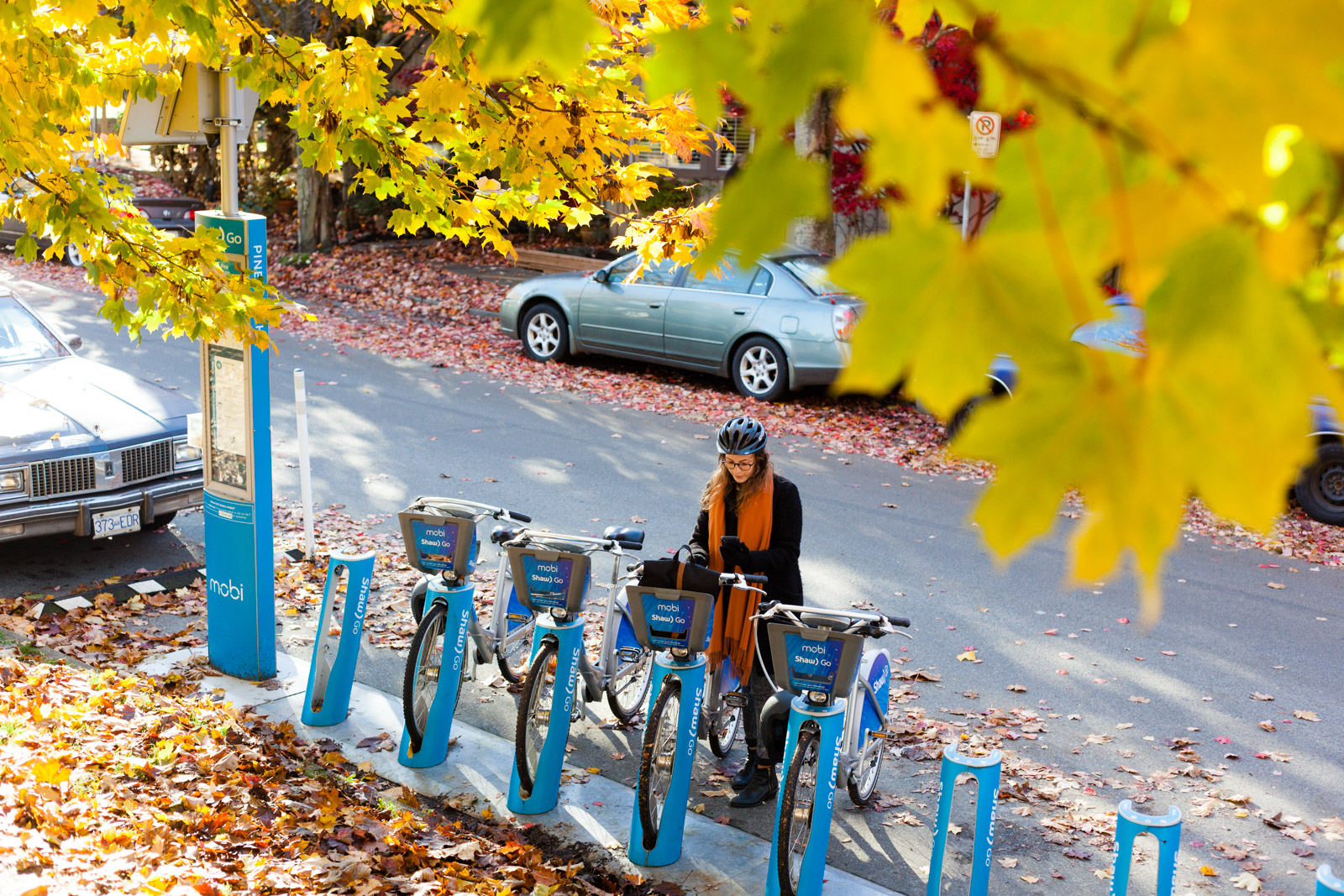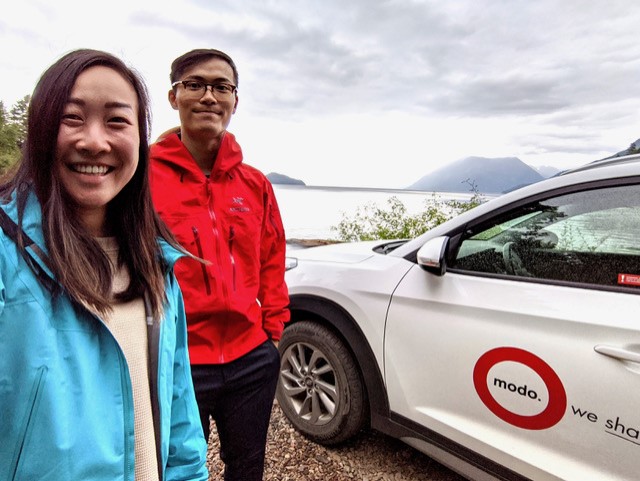What’s mine is yours
First, a primer: the sharing economy is a system built around the sharing of assets, with the goal of improving efficiency, sustainability and community. Essentially, by choosing to share items such as vehicles, recreation equipment, or tools, consumers put less strain on the market to overproduce consumer goods as individual purchases are replaced by borrowing and lending across the community.
The sharing economy, also known as collaborative consumption or peer-to-peer, has gained traction by its promise to reduce the weighty environmental impacts of individual consumerism. Sharing economy businesses – such as Ruckify and Vancouver-based Quupe, Modo, and Mobi by Shaw Go – act as facilitators, enabling consumers across neighbourhoods and regions to collectively access shared goods.
Sharing economy businesses can encompass everything from neighbourhood lending libraries to cross-country enterprises. Regardless of scope and scale, each is united by a common vision of dispensing with individual ownership and encouraging sharing resources such as vehicles, tools, and outdoor equipment. Sharing economy businesses tend to flourish when used in a micro-localized context. For example, a report from the Ellen MacArthur Foundation found that 80 to 90 percent of the Toronto Tool Library lived within five kilometres of the sharing facility.
Care to share in Vancouver?
Vancouver is home to several sharing economy business models:
Mobi by Shaw Go
was launched in July 2016, in partnership with the City of Vancouver, is a Vancouver-based bike share program. Individuals who sign up to Mobi can unlock bikes from any docking station around the city; post-trip, bikes can be returned to any nearby dock station. Mobi by Shaw Go serves 29 square kilometers of Vancouver, with over 2,000 bikes at 200 stations. The service is meant for short, quick trips around the city. Riders of Mobi by Shaw Go use the bike share for the convenience of one-way trips and to avoid bike theft of personal bikes.Modo, launched in 1997, is a BC-based co-operative that strives to meet the shared economic, social, and cultural needs of their members through a jointly owned and democratically controlled enterprise. Modo’s 12,000 member-owners have pooled over six million dollars to buy and share hundreds of cars, enabling all members benefit from affordable and sustainable access to vehicles.
“The economic and environmental advantages of using a shared vehicle are overwhelmingly positive,” said Patrick Nangle, CEO of Modo.
Pandemic effects on sharing
Early on, the pandemic and its associated health measures had predictable and devastating initial effects on sharing economy businesses.
In March 2020, Modo saw a 60 percent reduction in users than the previous year, with low usage rates continuing through mid-April as co-op members followed public health guidance to stay close to home. Normally, forty-five percent of Mobi by Shaw Go users make trips in combination with public transit. With a decrease in downtown commuters during the pandemic, the bike-sharing company also felt the most immediate impact on ridership in March 2020. Meanwhile, Quupe temporarily ceased operations altogether to assess and adapt its business model to the global pandemic.
However, additional preparation, perseverance and proactive communication with members across each platform soon paid off and business began to rebound.
After reopening in April, Quupe saw higher membership than ever, despite a decrease in overall sharing activity. As the provincial government relaxed restrictions, Modo members began using the service more often. Currently, Modo usage has recovered to 80 to 90 percent of last year’s volume. While Mobi by Shaw Go saw fewer trips ending in the downtown core, the bike-sharing program recorded more local and recreational bike rides, particularly leisure trips around Stanley Park and along the seawall.
Since opening its Vancouver marketplace in June 2020, Ruckify’s month-over-month user growth has consistently exceeded 20 percent. While popular categories like event rentals became irrelevant once the pandemic hit, they were quickly replaced by a surge of interest in rentals related to outdoor activity and DIY project. The number of lenders also increased, likely due to the need to offset lost income that came with the pandemic.
Sharing to support the community
True to the spirit behind the sharing economy, during the pandemic all platforms offered some form of collective-focused benefit, including preferential rates for essential workers or fee freezes as the pandemic squeezed the economy.
Early on, Modo offered an essential worker transportation program, in which Modo cars taken off the street due to decreased usage were made available to essential workers for extended periods at favourable rates. The co-op, committed to people before profit, has been able to retain all staff by leveraging the Canada Emergency Wage Subsidy (CEWS).
Like Modo, Mobi by Shaw Go offered free short-term membership to essential service workers during the beginning of the pandemic. Nearly 8The00 essential workers utilized the membership; significantly, only 13 percent had previously used Mobi by Shaw Go.
During COVID-19, Ruckify collaborated with the United Way on a social connection program. United Way in Calgary and Ottawa were inundated with requests to help transition clients to work remotely. In response, Ruckify worked with technology recycling companies to redistribute over 250 old laptops to vulnerable community members who needed to be connected.
Despite decreases in sharing amongst users, Quupe refrained from raising prices to ensure the platform remains accessible to all while continuing to build out its offerings. Quupe intends to release resources that help the local community better understand the positive impacts of the sharing economy, including reducing greenhouse gas emissions and diverting waste from landfills.
Keeping it clean
Over the past year, sharing economy businesses adapted stricter cleaning protocols to ensure current users’ ongoing health and safety while reassuring new users that sharing can safely continue throughout the pandemic.
Ruckify offers express curbside pick-up and drop-off to reduce contact. To promote safe delivery, the company encourages lenders to thoroughly sanitize their items before and after the rental cycle.
Through three surveys conducted during the pandemic, Modo found that its usage reduction was largely related to members having fewer places to go. Indeed, members reported that they will use the co-op’s shared vehicles more “when things open up again.” Though relatively few members were worried about contracting COVID-19 in a Modo car, the company increased the frequency of cleaning and added hand sanitizer to each vehicle. To date, the co-op has not been made aware of any cases of COVID-19 related to Modo car use.
Sharing to support small businesses
When COVID-19 first hit, many small businesses scrambled to get their business online and reach their customers through a new interface. However, Quupe and Ruckify were already primed to help small businesses pivot by using their online platform.
Quupe has noticed an increase in small video studios and photographers joining the Vancouver platform, hoping to share their equipment with aspiring photographers and generate additional revenue.
Ruckify has helped small businesses by offering a platform on which they can rent their goods and services. The company has also partnered with businesses such as Black Tie Skis in Whistler to help shift their target audience from international tourists to a more local clientele.
How to take part in the sharing economy
By participating in the sharing economy, users benefit from enhanced access to outdoor activities, tools to take up a new hobby, or transportation that opens up opportunities to explore Metro Vancouver and beyond – all while reducing their environmental footprint. Furthermore, the social impact and logistical strength of sharing economy businesses have served as connective, humane points for communities weathering the pandemic.
Are you interested in exploring membership with one of these services?
Photos: Mobi by Shaw Go and Modo





